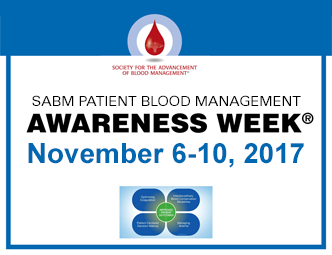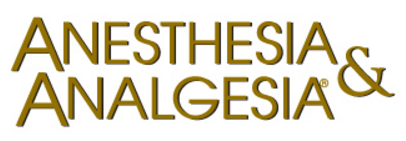SUMMER 2017
ISSUE

The Society for the Advancement of Blood Management (SABM)
invites healthcare organizations worldwide to participate in this week dedicated to educating patients and healthcare professionals about patient blood management.
Download SABM's
Patient Blood Management Awareness Week 2017
Poster and Timeline
Please consider making a donation to your Society. Your donations will help us to improve the lives of people throughout the world through Patient Blood Management.

SABM 2017 Newsletter Publication Schedule
February | May | August | November
Editor
Carolyn Burns, MD
Associate Editor
Tiffany Hall, RN
Contributors
James Brown, MHA, CCP
Carolyn Burns, MD
Nabil Hassan, MD
Tiffany Hall, RN
Mary Ann O’Brien RN, MSN, CCRN, CNE
Becky Rock, RN
Kevin Wright
Zac Zahara, MBA and team
Transition Director
Sherri Ozawa, RN
SABM Officers and
Directors
|
|
Breaking Clinical News
Post-partum hemorrhage (PPH) is a leading cause of maternal morbidity and mortality throughout the world. Numerous interventions to treat hemorrhage and to limit exposure to transfusion have been proposed over the past years, stressing the need for readiness, recognition, response and reporting. Given the pathophysiology of PPH, antifibrinolytics, such as tranexamic acid, have been proposed as part of over-arching hemorrhage protocols. Although there have been retrospective, cohort or observational studies with TXA in this clinical scenario, only recently has there been a randomized controlled trial. Many of us in the patient blood management (PBM) community, along with our obstetric colleagues, have been anxiously awaiting the results.
The Lancet, 2017, provides the details of the WOMAN Trial¹, a multicenter, international RCT which enrolled over 20,000 women over 16 years of age, who were identified with PPH after either vaginal or caesarean delivery. The women were randomized to receive either 1.0 gram of TXA intravenously or placebo along with standard care at the time of recognition of hemorrhage. Death due to bleeding was reduced by 19% with the use of TXA and by 31% in those patients who received this drug within three hours of onset of hemorrhage. Adverse events, specifically thrombo-embolic events, were no different between groups.
One of the four SABM Guiding Principles of PBM is to optimize coagulation, reduce bleeding and thus reduce exposure to transfusion. These results are nothing short of astounding and provide, all of us who help with the care of these patients, support for another well-investigated and much-needed intervention.
The WOMAN Trial Collaborators are to be commended for this study. It opens doors for better treatment and also for further investigation in the arena of women’s health.
Contributor: Dr. Carolyn Burns
¹ Shakur H et al. (WOMAN Trial Collaborators) Lancet 2017; doi: 10.1016/S0140-6736(17)3638-4
|
|
PBM for Patient Blood Management Section

Save the Date for SABM's Annual Meeting
September 7 – 9, 2017
Hilton & Executive Tower
Portland, Oregon
PBM Certificate Course
September 6, 2017
7:00am – 6:00pm
Annual Meeting
September 7 – 9, 2017

Consider submitting your future manuscripts in PBM for peer review and publication in this new section. The success of this endeavor will depend on the provision of material to make it lively and attractive to our colleagues and other professionals in the field.
Members Invited to Submit Papers CLICK HERE
Join SABM's Call to Action for Medicare to Expand Coverage for Treatment of Anemia!
Click HERE for detailed information about what you can do to get involved.
© 2017 Society for the Advancement of Blood Management
350 Engle Street
Englewood, NJ 07631
Phone: (928) 551-6400
Fax: (877) 944-2272
EMAIL: [email protected]
|